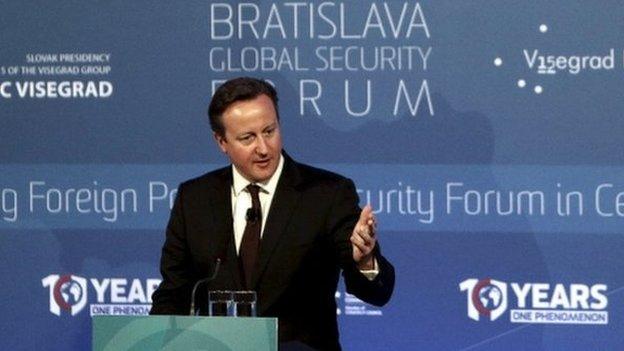Bradford Dawood family 'split to cross Syria border'
- Published
The border crossing where the family would have entered Syria is poorly guarded, as Paul Wood reports
Three Bradford sisters and their nine children split into two groups to cross the border into Syria, an Islamic State smuggler has told the BBC.
The smuggler in charge of some of IS's border operations said the first group went early on Wednesday and the second on Thursday.
Sisters Khadija, Sugra and Zohra Dawood and their children went missing after travelling to Saudi Arabia.
On Tuesday, two of their husbands made an emotional appeal for them to return.
Akhtar Iqbal and Mohammed Shoaib said they "could not live" without their families and begged them to come home.
Their lawyer Balaal Khan said they were shocked to hear that the women had entered Syria and urged the police to corroborate the smuggler's information.
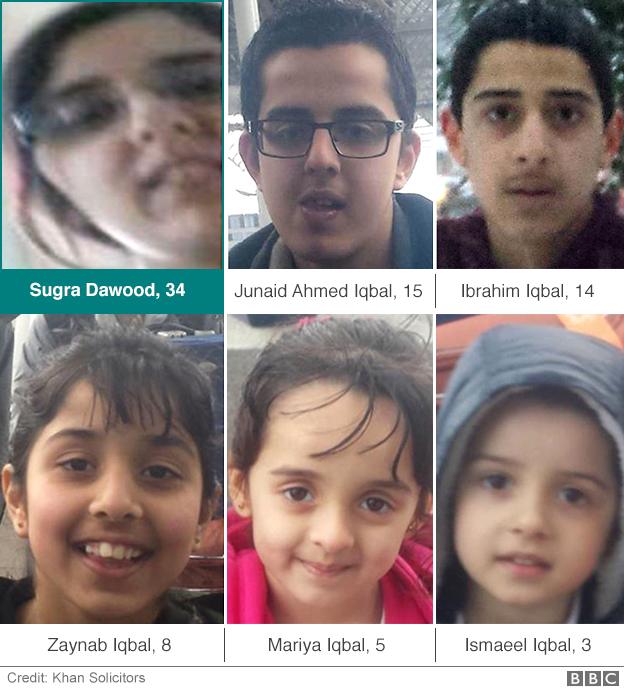
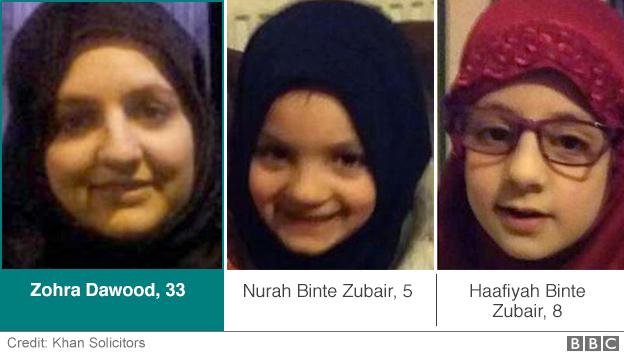
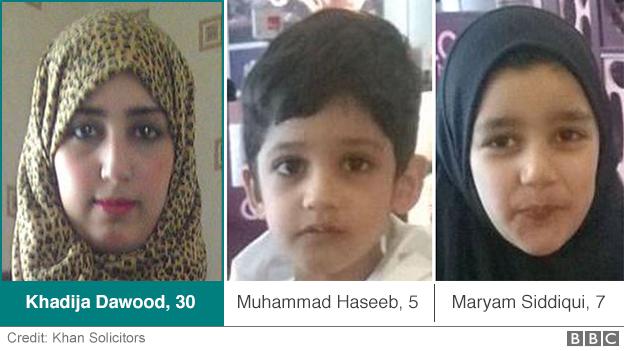
BBC Middle East correspondent Paul Wood, who is on the Turkish-Syrian border, said he had spoken to the smuggler who confirmed the crossing.
"If what he says is true, it clears up the main ambiguity of this story - whether the sisters were really heading for the so-called Islamic State, or some other part of Syria, controlled by some other armed group," said our correspondent.
He said the information came up during a casual conversation with the smuggler, who is known to be an IS member, but when asked for an interview about the incident he asked for money which the BBC refused.
The information also fits with the news that one of the sisters, Zohra, sent a message to her family that she was inside Syria - but she did not say exactly where.
The North East Counter Terrorism Unit said it was "continuing to make extensive enquiries" in order to try to bring the women and children home.

The smugglers network
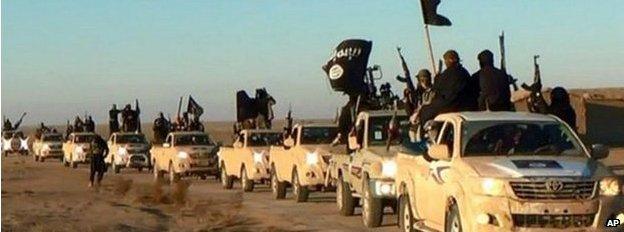
By Paul Wood, BBC Middle East correspondent
Every armed group in Syria has its own network of smugglers - and the so-called Islamic State is no different.
They move people - and sometimes cash and weapons - across the border for profit and for the cause.
Like all smugglers, IS uses a network of safe houses along the border, though the area of border open to them has been shrinking as they lose territory to a Kurdish military advance, backed by US airstrikes.
The Turkish security forces occasionally shoot, and kill, people crossing the border illegally, but most crossings are uneventful with many smugglers coming to "an arrangement" with the Turkish border guards.
Once inside Islamic State territory, however, the women and their children will not be allowed to leave.
I spoke to an activist who runs a secret network trying to get disenchanted jihadis out of the so-called caliphate.
He told me some 400 had been killed trying to leave - and that 200 women were under house arrest.

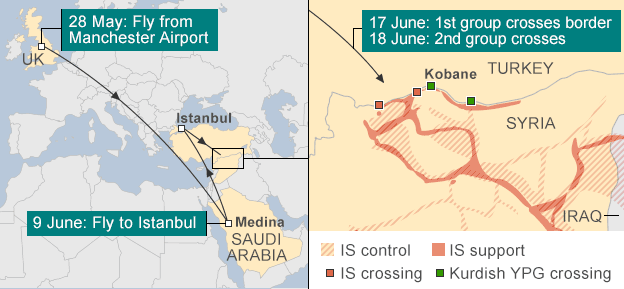
The group went missing following a religious pilgrimage to Saudi Arabia.
They travelled to the Saudi city of Medina on 28 May and were last seen in a hotel in the city.
The family was supposed to fly to Manchester following their pilgrimage, but their husbands reported them missing when they did not return. They had last spoken to their children on 8 June.
The women's brother is understood to be fighting with extremists in Syria and it is believed the group missed a previous flight to Saudi Arabia in March after being questioned by security officials.
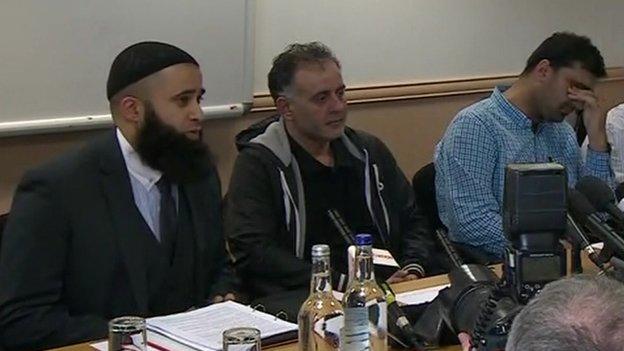
Mohammed Shoaib (right) appeared in tears at the press conference alongside Akhtar Iqbal (centre) and family lawyer Balaal Khan
Bradford Council said they had not been made aware of any issues surrounding the family or the safety of their children ahead of the disappearance.
At a press conference on Tuesday Mr Iqbal made an emotional appeal to his wife Sugra, saying: "I'm shaking and I miss you. It's been too many days."
Mr Shoaib, husband of Khadija, dismissed any suggestions the sisters were in unhappy relationships saying he and his wife of 11 years had a "perfect relationship".
Syed Zubair Ahmed, the estranged husband of Zohra Dawood did not attend as he is currently in Pakistan, where he has been living for the past seven months.
'Quietly condoning IS'
David Cameron: "There are people who... buy into some of these prejudices, giving the extreme Islamism narrative weight and telling fellow Muslims, 'you are part of this'"
Prayers were said for the family at their local mosque in Bradford on Friday and the service was expected to mention the importance of the community in stopping people from becoming radicalised.
Dr Mohammed Iqbal, president of Bradford's Ahmadiyya Muslim Association, has insisted that propaganda was reaching Muslims over the internet, not through mosques.
But Manzoor Moghal, chairman of the Muslim Forum, accused families of those travelling to Syria and Iraq of "endlessly pointing the finger at others" and said communities should take responsibility.
It comes as Prime Minister David Cameron has warned of the dangers posed by those who "quietly condone" Islamic State militants' extremist ideology.
Speaking at a security conference in the Slovakian capital Bratislava, he stressed the importance of tackling radicalisation at its source.
- Published17 June 2015
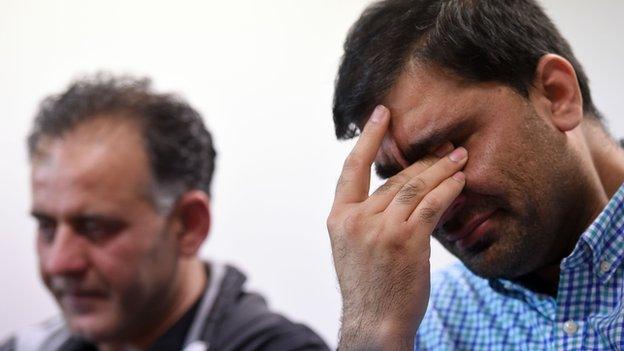
- Published19 June 2015
